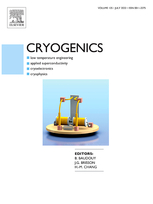
Analyse numérique couplée de la température des écrans, des pertes thermiques et des pressions du gaz résiduel dans un superisolant sous vide, combinant réseaux thermiques et réseaux de fluides. III. Régime transitoire (période de tirage au vide).
A coupled numerical analysis of shield temperatures, heat losses and residual gas pressures in an evacuated super-insulation using thermal and fluid networks. III. Unsteady-state conditions (evacuation period).
Auteurs : REISS H.
Type d'article : Article
Résumé
This paper analyses the evacuation period of a 300 L super-insulated cryogenic storage tank for liquid nitrogen. Storage tank and radiation shields are the same as in part I of this paper. This analysis extends application of stationary fluid networks to unsteady-states to determine local, residual gas pressures between shields and the evacuation time of a multilayer super-insulation. Parameter tests comprise magnitude of desorption from radiation shields, spacers and container walls and their influence on length of the evacuation period. Calculation of the integrals over time-dependent desorption rates roughly confirms weight losses of radiation shields obtained after heating and out-gassing the materials, as reported in the literature. After flooding the insulation space with dry N2-gas, the evacuation time can enormously be reduced, from 72 to 4 h, to obtain a residual gas pressure of 0.01 Pa in-between shields of this storage tank. Permeation of nitrogen through container walls is of no importance for residual gas pressures. The simulations finally compare freezing H2O-layers adsorbed on shields, spacers and container walls with flooding of the materials. [Reprinted with permission from Elsevier. Copyright, 2006]. See also the Bulletin of the IIR, reference 2005-1097 and this Bulletin, reference 2007-0011.
Détails
- Titre original : A coupled numerical analysis of shield temperatures, heat losses and residual gas pressures in an evacuated super-insulation using thermal and fluid networks. III. Unsteady-state conditions (evacuation period).
- Identifiant de la fiche : 2007-0012
- Langues : Anglais
- Source : Cryogenics - vol. 46 - n. 12
- Date d'édition : 12/2006
Liens
Voir d'autres articles du même numéro (4)
Voir la source
Indexation
-
A coupled numerical analysis of shield temperat...
- Auteurs : REISS H.
- Date : 12/2006
- Langues : Anglais
- Source : Cryogenics - vol. 46 - n. 12
Voir la fiche
-
HEAT TRANSFER AND TEMPERATURE PROFILE STUDIES I...
- Auteurs : ARUNACHALAM S.
- Date : 1983
- Langues : Anglais
- Source : Indian J. Cryog. - vol. 8 - n. 2
Voir la fiche
-
Cryogenic chilldown process under low flow rates.
- Auteurs : YUAN K., JI Y., CHUNG J. N.
- Date : 09/2007
- Langues : Anglais
- Source : International Journal of Heat and Mass Transfer - vol. 50 - n. 19-20
Voir la fiche
-
UNSTEADY STATE HEAT TRANSFER IN SUPERINSULATED ...
- Auteurs : ARUNACHALAM S.
- Date : 1983
- Langues : Anglais
- Source : Indian J. Cryog. - vol. 8 - n. 2
Voir la fiche
-
A liquid nitrogen cooled sample stage for a sca...
- Auteurs : CHHATWAL H. L., GOSWAMI T. R.
- Date : 1992
- Langues : Anglais
- Source : Cryogenics - vol. 32 - n. 7
Voir la fiche
